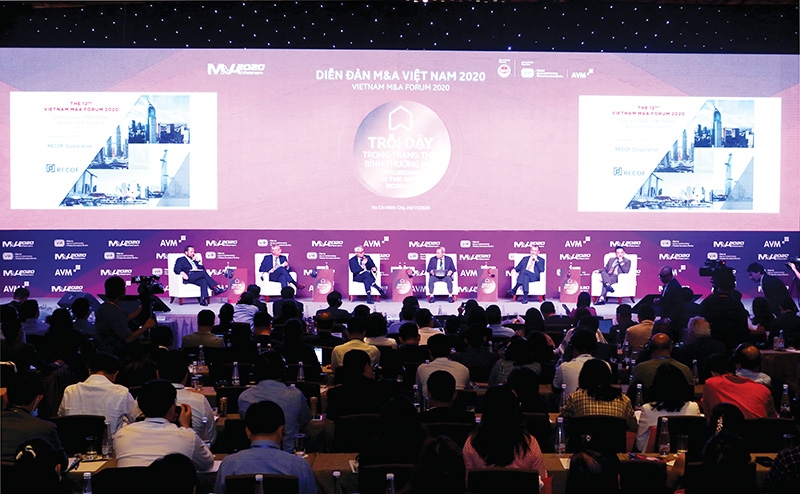Vietnam in driving seat for M&A wins
 |
| The 12th Vietnam M&A Forum welcomed renowned Vietnamese and international speakers, and honoured the best deals, photo Le Toan |
In so far successfully containing the coronavirus pandemic, investors are turning their attention in greater numbers to Vietnam and the prospects it holds in terms of conducting mergers and acquisitions (M&A) deals, with the experts believing that companies making M&A moves typically outperform those that do not.
“There are three clouds hanging in the sky that make it more difficult to close a deal when things are not over – the US presidential handover, the COVID-19 pandemic, and the general uncertainties in the global and domestic economy,” said Warrick Cleine, chairman and CEO of KPMG in Vietnam and Cambodia. “I have been working for a long time in this country, but this is the first time I’ve ever witnessed such strong market volatility sweeping across all sectors, especially in tourism-related companies.”
Unarguably, Cleine said, an M&A approach could leave a profound effect on businesses’ growth and development. “However, the price tag for the deal might sometimes be steep and acquisition premiums might be larger than expected. Currently, many Vietnamese sellers offer quite high prices,” he added.
Meanwhile Lim Hua Tiong, CEO of Frasers Property Vietnam, also expressed that pricing is among the most sensitive part of the M&A journey, so acquirers should carry out thorough legal and financial due diligence before closing any deal.
“As one of the most active property providers in Vietnam, we have conducted a variety of deals over the past decade. Vietnam, Malaysia, and Singapore present very appealing investment opportunities. Although the progress of adapting and changing the legal requirements to open up more opportunities for M&A investors seems slow, many of our partners are still keen on acquiring local enterprises in Vietnam,” Tiong told VIR.
Other experts also warned that many foreign investors prefer to acquire stakes of Vietnamese companies, especially some state-owned enterprises, but a large proportion of their outstanding stocks are already taken. Therefore, they have to purchase from other investors, which leads to market-to-market loss on investment due to significant higher prices.
Market reaction to news of an M&A transaction may be favourable or unfavourable, meanwhile, depending on the perception of market participants and the resulting merits of the deal.
Paul DiGiacomo, senior executive director of BDA Partners, stated that since the beginning of the year there have been many areas with good growth in Vietnam, especially in the personal consumption segment as homebuyers are increasing in numbers. “Thanks to a young and tech-savvy population, Vietnam is now emerging as a bright star in the region, luring many high-profile investors from Thailand, Japan, and South Korea. Institutional investors and private equities are showing their keen interest in prominent industries,” DiGiacomo said at the forum.
He expects dealmaking activities to become more robust in education, healthcare, infrastructure, supply chain, and payments. “For instance, South Korean and Japanese behemoths now pay much more attention to the Vietnamese market and will expand their production here. This will prompt local suppliers and vendors to raise the bar to meet higher requirements,” DiGiacomo shared.
He also expressed his optimism on Vietnamese businesses making further inroads in overseas markets.
On the flip side, M&A transactions can sometimes fail due to corporate culture, or lack of cultural fit. Denis Brunetti, president at Ericsson in Vietnam, Myanmar, Cambodia, and Laos, shared how diversification in labour force is an impetus for the whole economy.
“When I first set foot in Vietnam in 1996, the working environment was basically full of working men, which is in stark contrast with the current labour force now. At the moment, Vietnam is very diverse in its workforce, and the gap between men and women is significantly narrowing,” Brunetti said. “I believe Vietnam’s prosperity will considerably depend on how people, regardless of their age, gender, or social background, can bring differences as well as their dedication to the whole of society.”
On the other hand, dealmaking is the utmost crucial factor of property developers in a bid to expand its operation, illustrated in the case of Novaland.
Nguyen Thai Phien, senior director of Corporate Finance at Novaland Group said, “We have acquired land sites from other investors to develop projects. Just a few days ago, we bought a 286-hectare project in Dong Nai worth $1 billion. Novaland has a plan to transform this project into a tourism ecosystem.”
Phan Duc Hieu, deputy director of the Central Institute for Economic Management, reaffirmed his belief that M&A activities will speed up from the beginning of next year, when three amended laws on Investment, Enterprises and Securities will come into effect at the same time. On top of that, reformed corporate governance principles in the Law on Enterprises will promote tie-up deals.
What the stars mean:
★ Poor ★ ★ Promising ★★★ Good ★★★★ Very good ★★★★★ Exceptional
Related Contents
Latest News
More News
- BJC to spend $723 million acquiring MM Mega Market Vietnam (January 22, 2026 | 20:29)
- NamiTech raises $4 million in funding (January 20, 2026 | 16:33)
- Livzon subsidiary seeks control of Imexpharm (January 17, 2026 | 15:54)
- Consumer deals drive Vietnam’s M&A rebound in December (January 16, 2026 | 16:08)
- Southeast Asia tech funding rebounds on late-stage deals (January 08, 2026 | 10:35)
- DKSH to acquire Vietnamese healthcare distributor Biomedic (December 24, 2025 | 15:46)
- Central Retail refocuses Vietnam strategy with Nguyen Kim exit (December 24, 2025 | 15:01)
- RongViet Securities wins sixth consecutive M&A advisory award (December 22, 2025 | 17:30)
- Kido Group divests from ice cream and frozen foods (December 18, 2025 | 16:49)
- Insurtech startup Saladin wraps up Series A funding round (December 17, 2025 | 09:10)

 Tag:
Tag:


















 Mobile Version
Mobile Version